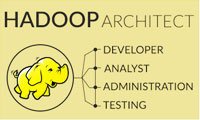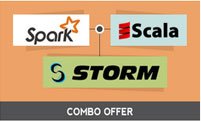Be the expert in Big Data processing by learning the conceptual implementation of Apache Storm and Apache Spark using Scala Programming
Key Features
This is a combo course including:
- Hadoop Developer Training
- Hadoop Analyst Training
- Hadoop Administration Training
- Hadoop Testing Training
- 70 hours of High-Quality in-depth Video E-Learning Sessions
- 90 hours of Lab Exercises
- Intellipaat Proprietary VM and free cloud access for 6 months for performing exercises
- 70% of extensive learning through Hands-on exercises , Project Work , Assignments and Quizzes
- The training will prepare you for Cloudera Certification: CCDH, CCAH as well as learners can learn how to work with Hortonworks and MapR Distributions
- 24X7 Lifetime Support with Rapid Problem Resolution Guaranteed
- Lifetime Access to Videos, Tutorials and Course Material
- Guidance to Resume Preparation and Job Assistance
- Step -by- step Installation of Software
- Course Completion Certificate from Intellipaat
About Apache Storm, Spark, Scala Training Course
It is an all-in-course designed to give a 360 degree overview of real-time processing of unbound data streams using Apache Storm and creating applications in Spark using Scala programming. The major topics include concepts of Big Data world, Batch Analysis, Types of Analytics and usage of Apache Storm for real-time Big Data Analytics, Comparison between Spark and Hadoop and Techniques to increase your application performance, enabling high-speed processing.
Learning Objectives:
After completion of Apache Storm course at Intellipaat, you will be able to:
- Understand basic distributed concepts and Storm Architecture
- Learn Hadoop Distributed Computing, Big Data features, Legacy architecture of Real-time System
- Know the Logic Dynamics, Components and Topology in Storm
- Understand the difference between Apache Spark and Hadoop
- Learn Scala and its programming implementation
- Implement Spark on a cluster
- Write Spark Applications using Python, Java and Scala
- Get deep insights into the functioning of Scala
- Implement Trident Spouts and understand Trident Filter, Function and Aggregator
- Learn Twitter Boot Stripping
- Work on Real-life Storm Project
- Work on Minor and Major Projects applying programming techniques of Scala to run on Spark applications
Recommended Audience:
- Professionals aiming to build career in real-time Data Analytics with Apache Storm techniques and Hadoop Computing
- Software Engineers who want to enhance their programming knowledge and are eager to learn resourceful concepts for Big Data processing
- Software Architects, Data Scientists, ETL Developers and Project Managers can enhance their working style by pursuing this course
- Graduates who are willing to add resourceful learning to their career with renowned and innovative technology courses
Pre-Requisites:
- It not mandatory to have Hadoop knowledge, but it would help to learn better.
- Minimal knowledge of Java basics are required
Why Take Apache Storm, Spark, Scala Training Course
- This course offers a reliable and faster means of real-time data processing for huge data streams
- In the present business scenario, organizations need to deliver faster results to clients and this course helps you learn quicker ways of data processing
- It will also help you gain a competitive edge over others and get a desired job in top multinational companies like Yahoo!, Twitter, WebMD, Alibaba.com, Spotify, Grupon, Flout, Flipboard.
Module 1 – Understanding Architecture of Storm
- Bayesian Law
- Hadoop Distributed Computing
- Big Data features
- Legacy Architecture of Real Time System
- Storm vs. Hadoop
- Logical Dynamic and Components in Storm
- Storm Topology
- Execution Components in Storm
- Stream Grouping
- Tuple
- Spout
- Bolt-normalization bolt
Module 2 – Installation of Apache storm
- Installing Apache Storm
Module 3 – Grouping
- Different types of Grouping
- Reliable and unreliable messaging
- Fetching data – Direct connection and En-queued message
- Bolt Lifecycle
Module 4 – Overview of Trident
- Trident Spouts and its types
- Components and Interface of Trident spout
- Trident Function, Filter & Aggregator
Module 5 – Boot Stripping
- Twitter Boot Stripping
- Detailed learning on Boot Stripping
- Concepts of Storm
- Storm Development Environment
Projects
Real-time Project on Storm
The Project Bolt Blue Print
Apache Spark
Module 1-Why Spark? Explain Spark and Hadoop Distributed File System
- What is Spark
- Comparison with Hadoop
- Components of Spark
Module 2-Spark Components, Common Spark Algorithms-Iterative Algorithms, Graph Analysis, Machine Learning
- Apache Spark- Introduction, Consistency, Availability, Partition
- Unified Stack Spark
- Spark Components
- Comparison with Hadoop – Scalding example, mahout, storm, graph
Module 3-Running Spark on a Cluster, Writing Spark Applications using Python, Java, Scala
- Explain python example
- Show installing a spark
- Explain driver program
- Explaining spark context with example
- Define weakly typed variable
- Combine scala and java seamlessly.
- Explain concurrency and distribution.
- Explain what is trait.
- Explain higher order function with example.
- Define OFI scheduler.
- Advantages of Spark
- Example of Lamda using spark
- Explain Mapreduce with example
Module 4-RDD and its operation
- Difference between RISC and CISC
- Define Apache Mesos
- Cartesian product between two RDD
- Define count
- Define Filter
- Define Fold
- Define API Operations
- Define Factors
Module 5-Spark, Hadoop, and the Enterprise Data Centre, Common Spark Algorithms
- How hadoop cluster is different from spark
- Define writing data
- Explain sequence file and its usefulness
- Define protocol buffers
- Define text file, CSV, Object Files and File System
- Define sparse metrics
- Explain RDD and Compression
- Explain data stores and its usefulness
Module 6-Spark Streaming
- Define Elastic Search
- Explain Streaming and its usefulness
- Apache bookeeper
- Define Dstream
- Define mapreduce word count
- Explain Paraquet
- Scala ORM
- Define Mlib
- Explain multi graphix and its usefulness
- Define property graph
Module 7-Spark Persistence in Spark
- Persistence
- Motivation
- Example
- Transformation
- Scala and Python
- Examples – K-means
- Latent Dirichlet Allocation (LDA)
Module 8-Broadcast and accumulator
- Motivation
- Broadcast Variables
- Example: Join
- Alternative if one table is small
- Better version with broadcast
- How to create a Broadcast
- Accumulators motivation
- Example: Join
- Accumulator Rules
- Custom accumulators
- Another common use
- Creating an accumulator using spark context object
Module 9-Spark SQL and RDD
- Introduction
- Spark SQL main capabilities
- Spark SQL usage diagram
- Spark SQL
- Important topics in Spark SQL- Data frames
- Twitter language analysis
Mini Projects
Project 1. List the items
Project 2. Sorting of Records
Project 3. Show a histogram of date vs users created. Optionally, use a rich visualization like
Project 4. Prepare a map of tags vs # of questions in each tag and display it.
Major Projects
Project 1 Movie Recommendation
Project 2 Twitter API Integration for tweet Analysis
Project 3 Data Exploration Using Spark SQL – Wikipedia dataset
Scala
Module 1-Introduction of Scala
- Scala Overview
Module 2-Pattern Matching
- Advantages of Scala
- REPL (Read Evaluate print loop)
- Language Features
- Type Interface
- Higher order function
- Option
- Pattern Matching
- Collection
- Currying
- Traits
- Application Space
Module 3-Executing the Scala code
- Uses of scala interpreter
- Example of static object timer in scala
- Testing of String equality in scala
- Implicit classes in scala with examples.
- Recursion in scala
- Currying in scala with examples.
- Classes in scala
Module 4-Classes concept in Scala
- Constructor
- Constructor overloading
- Properties
- Abstract classes
- Type hierarchy in Scala
- Object equality
- Val and var methods
Module 5-Case classes and pattern matching
- Sealed traits
- Case classes
- Constant pattern in case classes
- Wild card pattern
- Variable pattern
- Constructor pattern
- Tuple pattern
Module 6-Concepts of traits with example
- Java equivalents
- Advantages of traits
- Avoiding boilerplate code
- Linearization of traits
- Modelling a real world example
Module 7-Scala java Interoperability
- How traits are implemented in scala and java
- How extending multiple traits is handled
Module 8-Scala collections
- Classification of scala collections
- Iterable
- Iterator and iterable
- List sequence example in scala
Module 9-Mutable collections vs. Immutable collections
- Array in scala
- List in scala
- Difference between list and list buffer
- Array buffer
- Queue in scala
- Dequeue in scala
- Mutable queue in scala
- Stacks in scala
- Sets and maps in scala
- Tuples
Module 10-Use Case bobsrockets package
- Different import types
- Selective imports
- Testing-Assertions
- Scala test case- scala test fun. Suite
- Junit test in scala
- Interface for Junit via Junit 3 suite in scala test
- SBT
- Directory structure for packaging scala application
COURSE DURATION : 40 HRS
High quality interactive e-learning sessions for Self paced course. For online instructor led training, total course will be divided into sessions.
HANDS ON EXERCISE AND PROJECT WORK: 80 HRS
Each module will be followed by practical assignments and lab exercises. Towards the end of the course, you will be working on a project where would be expected to complete a project based on your learning. Our support team is available to help through email, phone or Live Support for any help required.
ACCESS DURATION: LIFETIME
You will get Lifetime access to high quality interactive e-Learning Management System . Life time access to Course Material. There will be 24/7 access to video tutorials along with online interactive sessions support with trainer for issue resolving.
24 X 7 SUPPORT
We provide 24X7 support by email for issues or doubts clearance for Self-paced training.
In online Instructor led training, trainer will be available to help you out with your queries regarding the course. If required, the support team can also provide you live support by accessing your machine remotely. This ensures that all your doubts and problems faced during labs and project work are clarified round the clock.
GET CERTIFIED
This course is designed for clearing any Apache Strom training organized by any reputed agency like HortonWorks. At the end of the course there will be a quiz and project assignments once you complete them you will be awarded with Intellipaat Course Completion certificate.
This course is designed for clearing Apache Spark Certification examination of any reputed company. At the end of the course there will be a quiz and project assignments once you complete them you will be awarded with Intellipaat Course Completion certificate.
At the end of the course there will be a quiz and project assignments once you complete them you will be awarded with Intellipaat Course Completion certificate.
JOB ASSISTANCE
Intellipaat enjoys strong relationship with multiple staffing companies in US, UK and have +60 clients across the globe. If you are looking out for exploring job opportunities, you can pass your resumes once you complete the course and we will help you with job assistance. We don’t charge any extra fees for passing the resume to our partners and clients
WHAT STORM DOES?
Now with Storm and MapReduce running together in Hadoop on YARN, a Hadoop cluster can efficiently process a full range of workloads from real-time to interactive to batch. Storm is simple and developers can write Storm topologies using any programming language. Five characteristics make Storm ideal for real-time data processing workloads. Storm is: Fast – benchmarked as processing one million 100 byte messages per second per node Scalable – with parallel calculations that run across a cluster of machines Fault-tolerant – when workers die, Storm will automatically restart them. If a node dies, the worker will be restarted on another node. Reliable – Storm guarantees that each unit of data (tuple) will be processed at least once or exactly once. Messages are only replayed when there are failures. Easy to operate – standard configurations are suitable for production on day one. Once deployed, Storm is easy to operate.
WHERE ALL APACHE STORM HAS BEEN IN USE PRESENTLY ?
Telecommunication – Silent Roamers Detection Banking – Fraud Transaction Detection Retail – Popular Retailers like Sears and Walmart Social Networking –Twitter
HOW CASSANDRA AND SPARK RELATED TO EACH OTHER?
Speed is crucial for maintaining a competitive edge. Cassandra, with its in-memory database option, can handle very high volumes of data at high velocity. This fits perfectly with Spark’s in-memory data analysis to provide the combination necessary to translate data into information in real time.
WHAT ARE THE DEVELOPER BENEFITS OF APACHE SPARK?
The Spark supported open source integration provides developers an easy path for their applications to run on top of. Also, both Spark and Cassandra allow developers to quickly write applications in languages such as Python, Java and others with updated drivers and support.
WHAT ARE VARIOUS SPARK COMPONENTS?
Cluster managers Hardware & configuration Linking with Spark Monitoring and measuring
WHAT IS INTELLIPAAT SELF-PACED TRAINING?
In Intellipaat self-paced training program you will receive recorded sessions, course material, Quiz, related software’s and assignments.The courses are designed such that you will get real world exposure and focused on clearing relevant certification exam. After completion of training you can take quiz which enable you to check your knowledge and enables you to clear relevant certification at higher marks/grade also you will be able to work on the technology independently.
HOW LONG DO I HAVE ACCESS TO SELF-PACED COURSES?
Lifetime.
HOW SELF-PACED COURSES ARE DIFFERENT FROM ONLINE TRAINING COURSES?
In Self-paced courses trainer is not available whereas in Online training trainer will be available for answering queries at the same time. In self-paced course we provide email support for doubt clearance or any query related to training also if you face some unexpected challenges we will arrange live class with trainer.
WHAT ARE THE BENEFITS OF INTELLIPAAT SELF-PACED TRAINING?
All Courses are highly interactive to provide good exposure. You can learn at your own place and at your leisure time. Prices of self-paced is training is 75% cheaper than online training. You will have lifetime access hence you can refer it anytime during your project work or job.
HOW SOON AFTER SIGNING UP WOULD I GET ACCESS TO THE LEARNING CONTENT?
As soon as you enroll to the course, your LMS (The Learning Management System) Access will be Functional. You will immediately get access to our course content in the form of a complete set of previous class recordings, PPTs, PDFs, assignments and access to our 24×7 support team. You can start learning right away.
WILL GET I ASSISTANCE OR SUPPORT IN SELF-PACED COURSES?
24/7 access to video tutorials and Email Support along with online interactive session support with trainer for issue resolving.
AT ANY STAGE, CAN I MOVE TO ONLINE TRAINING COURSE FROM SELF-PACED COURSE?
Yes, You can pay difference amount between Online training and Self-paced course and you can be enrolled in next online training batch.
WILL I GET THE SOFTWARE’S?
Yes, we will provide you the links of the software to download which are open source and for proprietary tools we will provide you trail version if available.
I AM NOT BEING ABLE TO ACCESS THE ONLINE COURSE. WHOM SHOULD I CONTACT FOR A SOLUTION?
Please send an email . You can also chat with us to get an instant solution.
HOW ARE YOUR VERIFIED CERTIFICATES AWARDED?
Intellipaat verified certificates will be awarded based on successful completion of course projects. There are set of quizzes after each couse module that you need to go through . After successful submission, official Intellipaat verified certificate will be given to you.
WILL I BE WORKING ON A PROJECT?
Towards the end of the Course, you will have to work on a Training project. This will help you understand how the different components of course are related to each other.
IS THERE ANY OFFER / DISCOUNT I CAN AVAIL?
Yes, We do keep launching multiple offers, please see offer page.
WHAT HAPPEN IF I DIDN’T CLEAR CERTIFICATION EXAM IN FIRST ATTEMPT?
We will help you with the issue and doubts regarding the course. You can attempt the quiz again.
Big Data Hadoop Training



No-sql Cassandra Hbase MongoDB Training



Big Data Hadoop, Spark, Storm, Scala Training – Combo



Apache Spark, Scala, Storm Training


